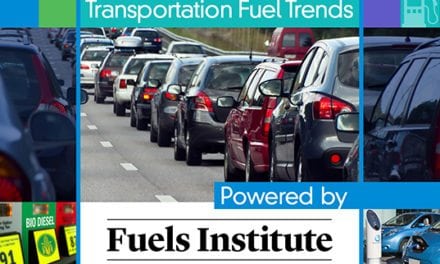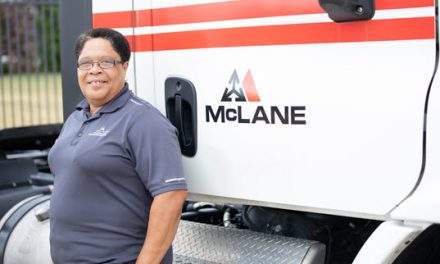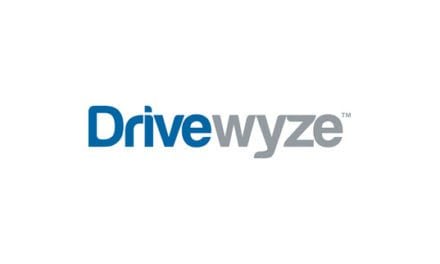B100 is one step closer to being a reality for commercial fleet operations thanks to the results of a pilot program that tested the fuel in five class-8 over-the-road trucks. The pilot, which was a collaboration among ADM, Optimus Technologies, Illinois Soybean Association, American Lung Association and the Missouri Soybean Merchandising Council, opens a pathway for significantly higher volumes of biodiesel in U.S. fleets moving forward.
“Today, most diesel engine manufacturers allow biodiesel up to B20 in their engines, but as we look toward the future and carbon reduction needs, we are looking for opportunities to run higher blends in this very necessary market,” says Scott Fenwick, technical director of the National Biodiesel Board. “The Optimus Vector System, an after-market system, allows engines to run on almost entirely B100 fuel year-round. And, run they did.”
The program, partially funded through the soybean checkoff, started in February of 2020 and ended in July 2021 with the five trucks totaling 623,922 miles during the trial.
The trucks used 73,186 gallons of B99.9, all being supplied through ADM’s Mexico, Missouri, soybean crush and biodiesel production facility, and ran in temperatures as low as -23F with zero operational challenges being reported.
“By using B100 in this study, we were able to reduce CO2 emissions by an estimated 1,376,048 lbs and demonstrate the impact biodiesel can have on carbon reductions moving forward,” says Colin Huwyler, CEO of Optimus Technologies. “The results of this study, including the fuel mileage parity observed by the drivers, continues to demonstrate a pathway forward for B100 in the commercial trucking sector.”
The nearly 18-month project evaluated the Optimus Vector System in longer-haul over-the-road fleets. The system, already in use in shorter-mileage, local fleet applications, is expanding into long-haul, commercial fleets moving forward. The technology provides a cost-effective alternative to electrification for decarbonizing commercial fleets.
“Our U.S. supply chain depends on long-haul trucks and we don’t see that changing anytime soon,” says Steve Finn, VP of ADM trucking. “This study helps give us and other fleets the data they need to feel secure in implementing new fuel blends to add to their sustainability efforts without sacrificing efficiencies.”
Technical data from the pilot includes fuel economy, performance and a look inside the engines themselves to evaluate emissions after treatment devices, fuel injectors and general wear. The official results will be released in 2022.
National Biodiesel Board
Made from an increasingly diverse mix of resources such as recycled cooking oil, soybean oil and animal fats, biodiesel and renewable diesel are better, cleaner fuels that are available now for use in existing diesel engines without modification. NBB is the U.S. trade association representing the entire biodiesel and renewable diesel value chain, including producers, feedstock suppliers, and fuel distributors.
Optimus Technologies
Optimus Technologies is a clean energy technology company based in Pittsburgh, Pennsylvania. Optimus manufactures The Vector System, an advanced fuel system technology that enables diesel engines to operate on 100% biodiesel. The Vector System is designed for medium and heavy-duty fleet applications where emissions reductions are challenging or impossible to achieve in a cost-effective manner through other means. The Vector System integrates into existing operations to facilitate a seamless transition to low-carbon fuels.
Optimus’ Vector System is in use with leading municipal and private fleets throughout the country such as DC Public Works and ADM. Use of The Vector System has enabled these fleets to achieve near-zero carbon emissions, while also reducing their fuel and fleet operating costs. Learn more at www.optimustec.com.
ADM
At ADM, we unlock the power of nature to provide access to nutrition worldwide. With industry-advancing innovations, a complete portfolio of ingredients and solutions to meet any taste, and a commitment to sustainability, we give customers an edge in solving the nutritional challenges of today and tomorrow. We’re a global leader in human and animal nutrition and the world’s premier agricultural origination and processing company. Our breadth, depth, insights, facilities and logistical expertise give us unparalleled capabilities to meet needs for food, beverages, health and wellness, and more. From the seed of the idea to the outcome of the solution, we enrich the quality of life the world over. Learn more at www.adm.com.
American Lung Association
The American Lung Association is the leading organization working to save lives by improving lung health and preventing lung disease through education, advocacy, and research. The Association’s Department of Clean Air Initiatives is dedicated to providing clean air for all through its award-winning Clean Air Choice® program, which focuses on promoting and implementing alternative fuels and technologies. Learn more at cleanairchoice.org.
Illinois Soybean Association
The Illinois Soybean Association (ISA) checkoff and membership programs represent more than 43,000 soybean farmers in Illinois. The checkoff funds market development and utilization efforts while the membership program supports the government relations interests of Illinois soybean farmers at the local, state, and national level, through the Illinois Soybean Growers (ISG). ISA upholds the interests of Illinois soybean producers through promotion, advocacy, and education with the vision of becoming a market leader in sustainable soybean production and profitability. For more information, visit the website www.ilsoy.org.
Missouri Soybean Merchandising Council
The Missouri Soybean Merchandising Council is a statewide, farmer-led organization working to improve opportunities for Missouri soybean farmers though a combination of research, outreach, education and market development efforts through the soybean checkoff. To learn more, visit the Missouri Soybean Merchandising Council online at mosoy.org.
United Soybean Board
United Soybean Board’s 78 volunteer farmer-directors work on behalf of all U.S. soybean farmers to achieve maximum value for their soy checkoff investments. These volunteers invest and leverage checkoff funds in programs and partnerships to drive soybean innovation beyond the bushel and increase preference for U.S. soy. That preference is based on U.S. soybean meal and oil quality and the sustainability of U.S. soybean farmers. As stipulated in the federal Soybean Promotion, Research and Consumer Information Act, the USDA Agricultural Marketing Service has oversight responsibilities for USB and the soy checkoff. For more information on the United Soybean Board, visit unitedsoybean.org.









